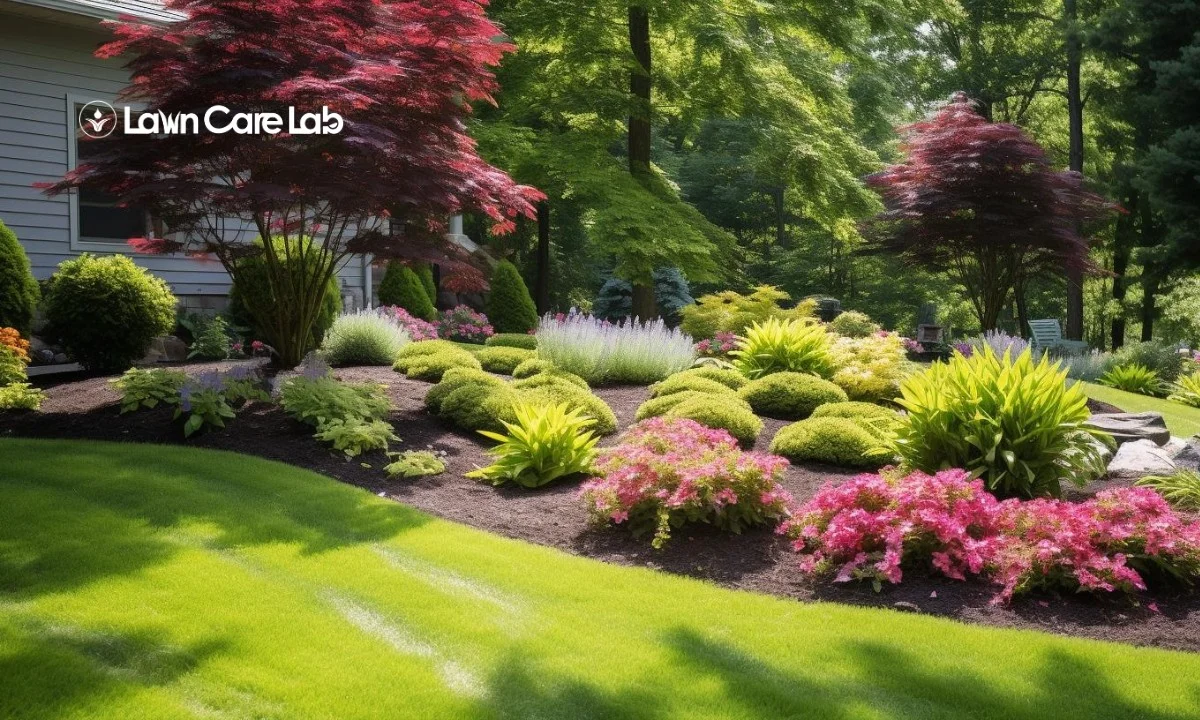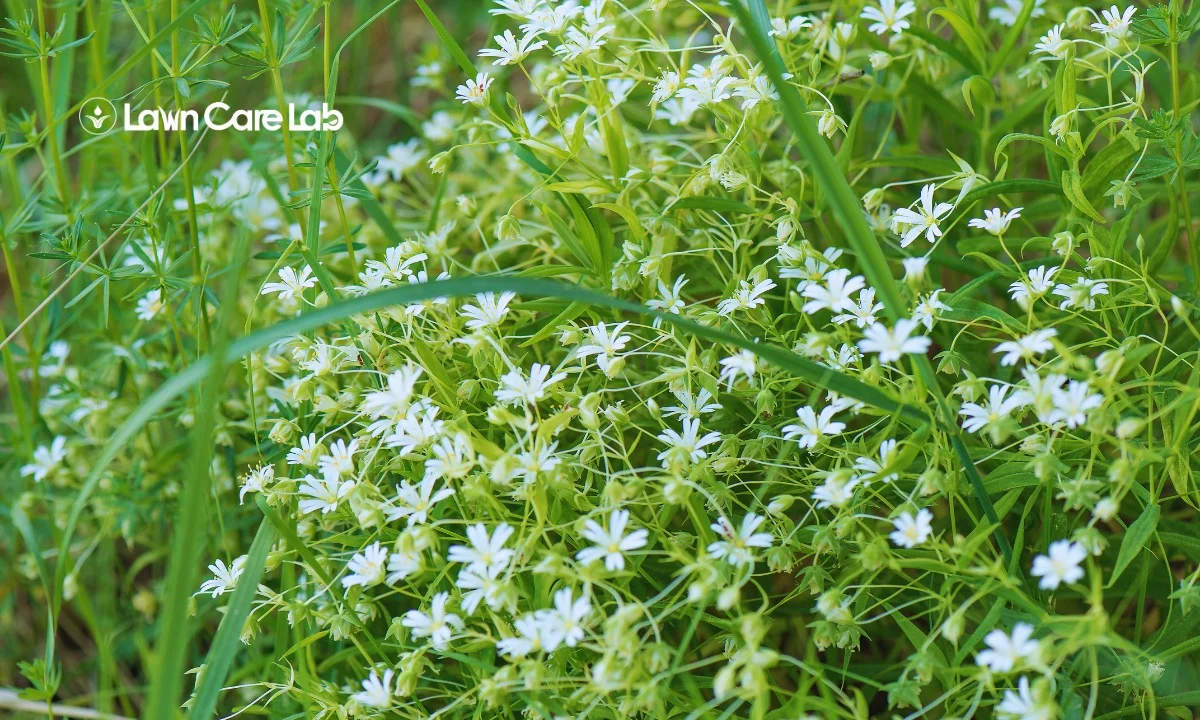The power of your lawn care routine to shape your local ecosystem is often overlooked. This article aims to highlight the surprising ways in which everyday gardening practices can tip the balance of nature.
Armed with this knowledge, you can make smarter, eco-friendly decisions, contributing to a healthier, more balanced environment. So, let’s proceed to understand how lawn care shapes local ecosystems.
In the words of renowned ecologist Aldo Leopold, ‘A thing is right when it tends to preserve the integrity, stability, and beauty of the biotic community.’ May our lawn care practices reflect this wisdom.
Table of Contents
Understanding the Interplay – Lawn Care and Local Ecosystems
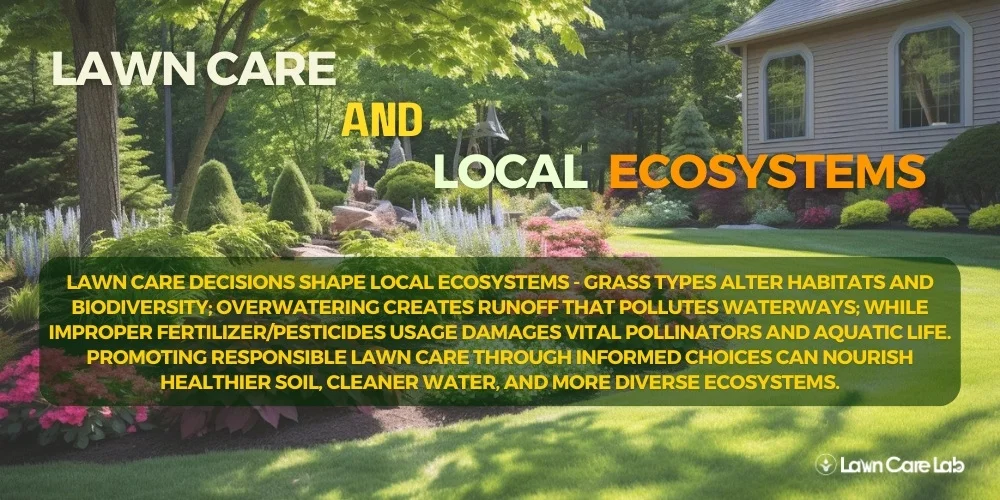
Your lawn maintenance routines can directly influence the local ecosystem. The grass variety you choose, water consumption, and use of fertilizers or pesticides can significantly change biodiversity,
water purity, soil vitality, and the harmony of the ecosystem as a whole. By making informed decisions, we can contribute positively to our environment, promoting healthier soil, cleaner water, and a more diverse ecosystem.
What is Lawn Care?
Understanding the environmental impact of lawn care is crucial for maintaining a lush yard that benefits our surrounding environment.
- Consistent mowing: Keeping the grass at a uniform height boosts the health and vibrancy of your lawn.
- Hydration and nourishment: Regular watering and fertilizer application are crucial for your lawn’s growth and disease resistance, just like any other plant.
- Aeration and over-seeding: These methods aid in soil oxygenation and density maintenance, fostering a healthier lawn and contributing positively to the ecosystem.
Each action you undertake has a ripple effect on your local ecosystem, emphasizing the need for thoughtful and responsible lawn care practices.
How Does Lawn Care Shapes Local Ecosystems?
Our gardening methods can affect the local ecosystem, especially when we overwater our plants. This can create harmful runoff, carrying fertilizers and pesticides into nearby streams and rivers, leading to eutrophication. This phenomenon can suffocate aquatic life by depriving them of essential oxygen.
| Lawn Care Practices | Direct Consequences | Ecosystemic Repercussions |
|---|---|---|
| Overwatering | Runoff | Eutrophication |
| Excessive Pesticides | Damage to Beneficial Insects | Pollinator Decline |
| Grass Species Selection | Habitat Alteration | Biodiversity Changes |
Pesticides and grass species can harm beneficial insects and biodiversity. Our lawn care choices matter, so we should opt for eco-friendly practices.
Revealing the Footprint: Lawn Care Practices and Their Consequences
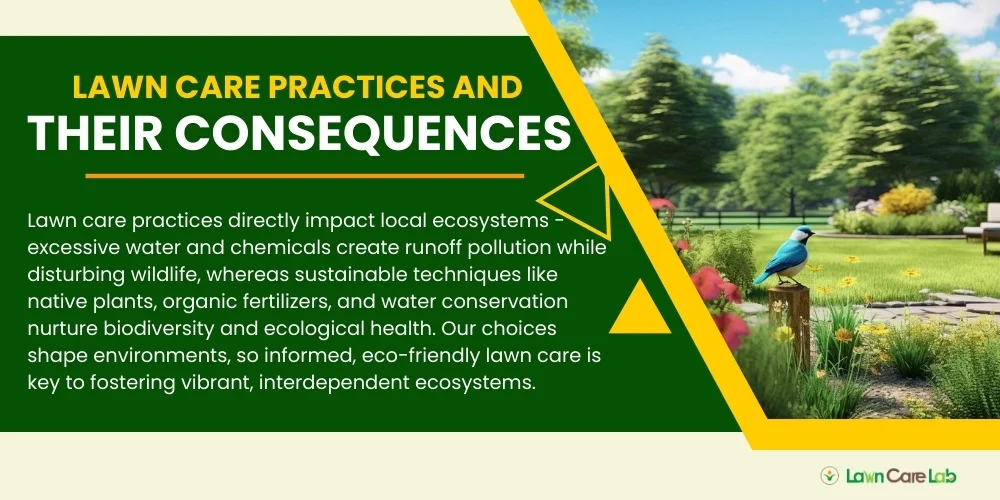
When gardening, it’s crucial to consider the environmental impact of your actions.
Traditional methods can harm the soil, water, and biodiversity. Eco-friendly techniques, on the other hand, can promote a healthier ecosystem, stronger soil, and sustainable water use.
Every decision you make in your garden affects the environment, so choose wisely. Remember, the garden of the world has no limits except in your mind.
Different Types of Lawn Care Practices
Your lawn practices impact the local ecosystem. Use organic fertilizers, conserve water, and plant native flora to protect ecosystem health. Overuse of synthetic products, excessive watering, and invasive plant species can cause ecological damage.
Using organic fertilizers, water conservation strategies, and planting native species can lead to a healthier lawn, reduce harmful runoff, and foster local biodiversity.
Over-watering and synthetic products can harm your lawn and the environment. Invasive species can crowd out native species, leading to reduced biodiversity.
Your lawn care choices can impact the environment. Choose eco-friendly measures to maintain local ecosystem health.
Eco-friendly Lawn Care Practices
In pursuing a lush, verdant lawn, the potential influence of sustainable methods on our local ecosystems is worth noting. Such methods encompass:
- The application of organic fertilizers: These natural compounds offer a nutrient-rich environment for your plants, nourishing the soil without harmful chemicals.
- The reduction of water usage: By optimizing your watering schedule, you not only conserve water but also promote deeper root growth in your lawn, resulting in a stronger and more resilient green space.
- The integration of native plant species: These plants are adapted to local conditions and help maintain biodiversity, providing habitats and food sources for indigenous wildlife.
Your backyard is part of a larger ecosystem. Adopting eco-friendly lawn care practices positively contributes to the world around us.
Detrimental Lawn Care Practices
Yard maintenance habits can unknowingly harm the environment. Excessive watering, synthetic fertilizers, and frequent mowing are primary offenders.
| Harmful Habits | Immediate Impact | Long-term Effects |
|---|---|---|
| Overwatering | Waste of precious resources | Soil degradation |
| Synthetic Fertilizers | Pollution through chemical runoff | Changes in soil health |
| Frequent Mowing | Disturbance and loss of wildlife habitat | Decline in biodiversity |
Now, let’s examine the effects of these habits on the local environment.
Consequences of Lawn Care Practices on Local Ecosystems
Your lawn habits can affect the local ecosystem. Organic gardening fosters biodiversity, while chemical pesticides lead to water pollution and species decline. Be a conscientious caretaker of our planet.
Let’s then strive to make choices that nurture rather than harm our shared home.
Positive Impacts and Negative Impacts
Each decision to maintain your lawn carries substantial beneficial and detrimental implications for your local environment.
- Indiscriminate use of water and pesticides can erode the quality of the soil and pollute our precious water sources.
- Conversely, mindful practices, such as incorporating indigenous plant species and employing organic fertilizers, can bolster biodiversity and nourish the soil.
- Additionally, judicious water usage can curb harmful runoff, thereby preserving the balance and safety of your local ecosystem.
By making thoughtful choices in our lawn care, we can contribute to a healthier, more robust ecosystem.
Striking a Balance: Sustainable Lawn Care and Ecosystem Health
Create a sustainable lawn supporting the ecosystem and promoting biodiversity to reduce environmental impact.
Choose native plants, save water, and avoid synthetic chemicals. These steps help maintain your lawn’s health and support ecosystem restoration.
Transitioning to Sustainable Lawn Care
Shift towards eco-friendly lawn maintenance by choosing indigenous plants, organic fertilizers, and water-conserving irrigation methods. This small step can make a big difference in supporting biodiversity, protecting soil and water bodies, and acknowledging our environmental responsibility.
Steps and Strategies for Sustainable Lawn Care
Adopting a series of eco-friendly lawn care tactics can profoundly impact the vitality and fortitude of your surrounding environment.
- Opt for local flora that flourish spontaneously in your region.
- Employ natural fertilizers to feed your lawn, steering clear of any potential environmental damage.
- Keep water consumption to a minimum.
Adopting these practices promotes a robust lawn and a sustainable environment. Remember, every small eco-friendly step makes a difference.
The Role of Sustainable Lawn Care in Ecosystem Restoration
Embracing eco-friendly lawn maintenance techniques fosters ecosystem vitality while preserving an aesthetically pleasing yard.
| Advantage | Eco-friendly Procedure | Effect |
|---|---|---|
| Revival of biodiversity | Cultivation of indigenous species | Bolsters populations of pollinators |
| Enhanced soil condition | Organic soil nourishment | Augments nutrient accessibility |
| Conservation of water | Optimal watering methods | Safeguards water supplies |
| Decreased reliance on chemicals | Natural pest deterrence | Mitigates environmental damage |
Opting for eco-friendly lawn care helps restore local ecosystems and promotes a sustainable future. Let’s work together to beautify our surroundings while contributing to the global mission of ecosystem rehabilitation.
The Future Perspective: Lawn Care in Harmony with Local Ecosystems
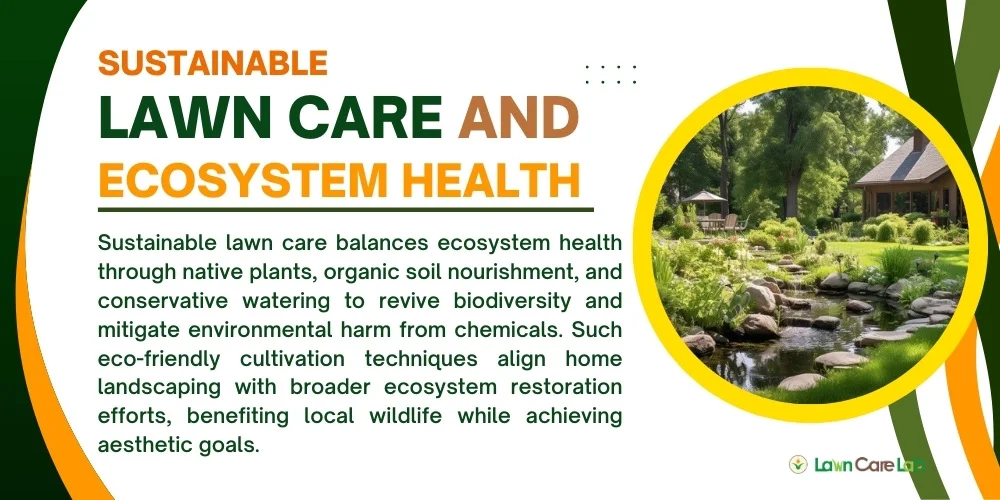
Our lawns are a part of larger ecosystems. By incorporating sustainable practices, we can foster a harmonious relationship between lawns and the environment. This requires mindfulness and sets a precedent for a future where both can flourish together.
Envisioning the Future – Lawn Care Practices in Harmony with Local Ecosystems
Visualize a future where lawn care transcends mere aesthetics. Instead, it’s a part of the larger narrative, a contribution to the well-being of the local ecosystem. By employing sustainable practices, this future is within reach.
Organic Fertilizers- A Safer Alternative: These fertilizers provide essential nutrients for your lawn and are an eco-friendly alternative to synthetic fertilizers that contribute to water pollution.
Water Conservation- A Need of the Hour: Effective watering systems coupled with water-efficient plants are essential in an era of water scarcity.
Native Plants- A Win-Win Situation: Native plants are naturally adapted to local ecosystems. They require less maintenance and promote biodiversity, benefiting local wildlife.
These lawn care practices ensure your yard’s safety and beauty and help nurture a healthier local ecosystem.
In this context, the future of lawn care isn’t just about maintaining a lush, green carpet of grass. It’s about fostering a harmonious relationship with nature.
- How to Create a Lawn Care Schedule for Southern Climates - October 30, 2024
- How to Use Compost Tea to Boost Lawn Growth and Soil Health - October 23, 2024
- The Best Grasses for Saltwater-Exposed Lawns: Coastal Lawn Care - October 17, 2024

